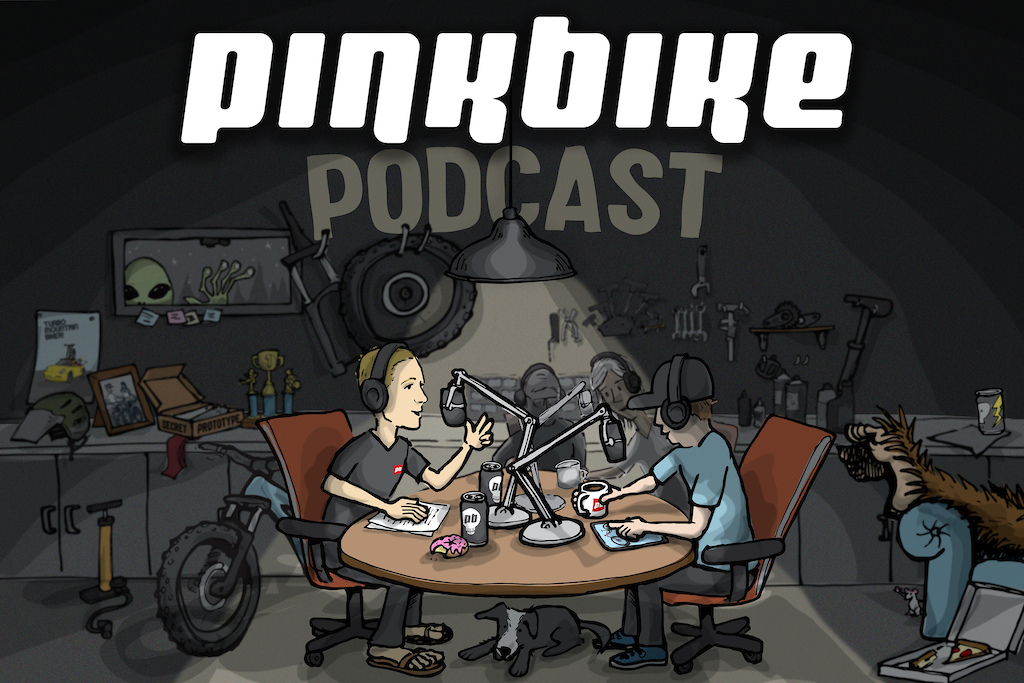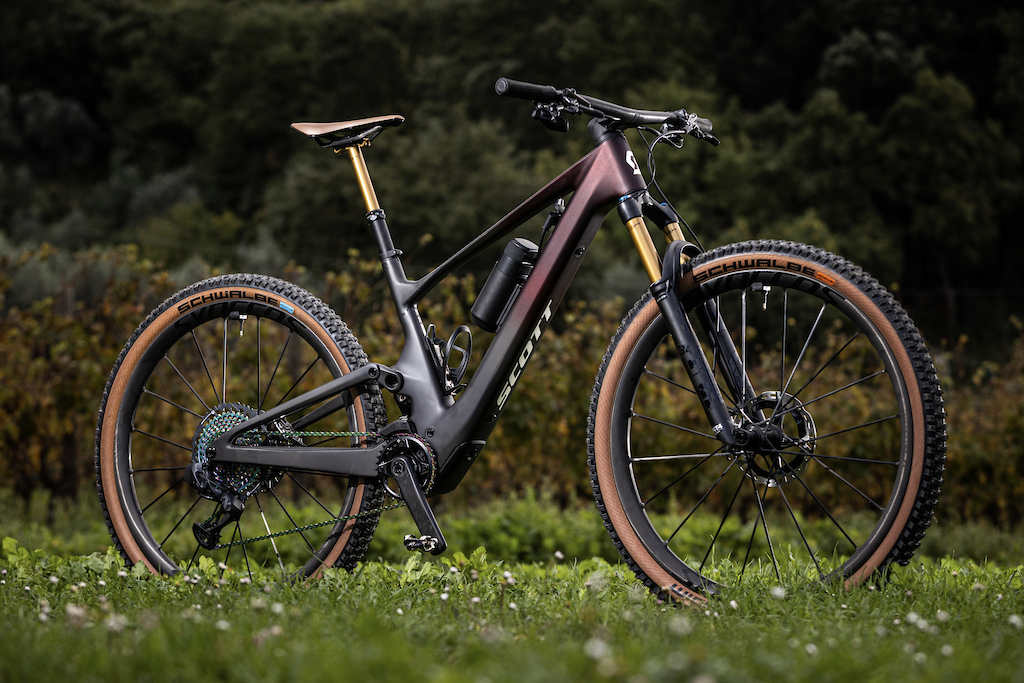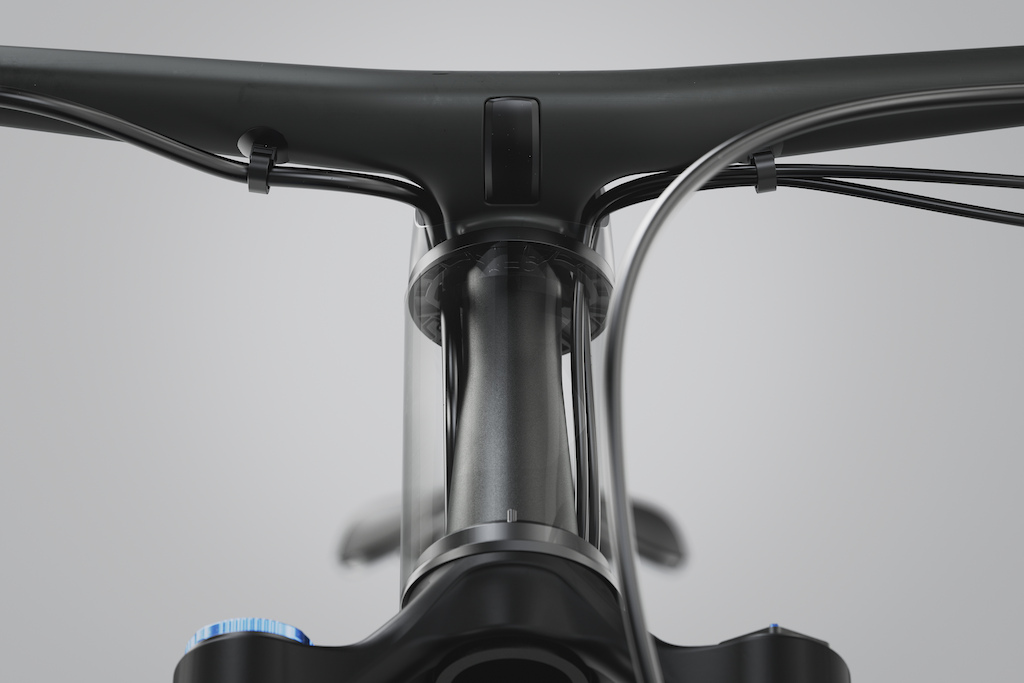The Pinkbike Podcast: Scott’s CMO Reto Aeschbacher on Integration, Marketing, and That Time They Tried Making Suspension
From their Unishock suspension fork in the early 90s, two-damper downhill rigs with huge seats, and some of the lightest frames around, to their modern mountain bikes with hidden shocks, Scott has a long history of doing things their way. Today's show sees us talking to Reto Aeschbacher, Scott Sports' CMO, about their US origins, how they handled Covid, e-bike sales versus mountain bike sales, marketing advice, and the future of integration.
Got a question for us or Scott? Post it down below and it might get answered.
THE PINKBIKE PODCAST // EPISODE 167 - SCOTT’S CMO RETO AESCHBACHER ON INTEGRATION, MARKETING, AND THAT TIME THEY TRIED MAKING SUSPENSION
Feb 24th, 2022
Scott's US origins, how they handled Covid, e-bike sales versus mountain bike sales, marketing advice, and the future of integration.
If you'd rather read than listen, below is an edited excerpt of our conversation with Reto that covers Scott's origins, how they handled Covid, and the risk and rewards of innovation.
Mike Levy: I'm Mike Levy and today I have Brian Park with me because we are talking to Reto Ashbacher, the CMO of Scott Sports. How are you doing today, and where are you?
Reto Aeschbacher: Hello everyone. I'm quite fine, and I'm on the other side of the ocean in Switzerland, based in our headquarters.
Levy: And is that you live there, too?
Reto: Living here in the neighborhood between Bern, which is the capital of Switzerland, and Fribourg.
Levy: I imagine, there is a whole bunch of good riding close by close to headquarters?
Reto: Yeah, actually, we have really good trails but we're very close to the mountains. So it's a perfect location for any sport we do at Scott, from skiing ski touring, trail riding, trail running, and road cycling. So, we are actually really in a perfect location.
Brian Park: When I was in Switzerland, I guess it was 2019 to visit Dan Roberts, we went to a mountain bike park near Scott Sports and the entire mountain was covered with Scott employees. That's an amazing mountain.
Levy: Basically, if it's outside, you guys are doing some part of it.
Reto: Yeah, you know, it was really organically grown. Scott was founded with their first ski pole back in 1958 in Sun Valley, Idaho. And then it started to grow into goggles, motorsports goggles, motorsport boots, then it went further into bike accessories. Then the triathlon handlebar that Greg LeMond used to win the Tour de France. And, you know, this was kind of all organically grown.
Levy: He used a Scott aero bar to win that Tour de France by seconds over Laurent Laurent Figion.
Reto: Exactly. Eight seconds.
Brian Park: When I was in Switzerland, I guess it was 2019 to visit Dan Roberts, we went to a mountain bike park near Scott Sports and the entire mountain was covered with Scott employees. That's an amazing mountain.
Levy: Basically, if it's outside, you guys are doing some part of it.
Reto: Yeah, you know, it was really organically grown. Scott was founded with their first ski pole back in 1958 in Sun Valley, Idaho. And then it started to grow into goggles, motorsports goggles, motorsport boots, then it went further into bike accessories. Then the triathlon handlebar that Greg LeMond used to win the Tour de France. And, you know, this was kind of all organically grown.
Levy: He used a Scott aero bar to win that Tour de France by seconds over Laurent Laurent Figion.
Reto: Exactly. Eight seconds.
Brian: Levy pulling out the deep knowledge, the deep lore.
Levy: When what year was that? What year was your guys' first bike product?
Reto: It was in 1986. We came with bikes and this was kind of a bit of a gold rush over here, with mountain bikes. Every bike was basically sold whenever it arrived on the market and it was like really the sport at this time.
Levy: Sun Valley is very different than Switzerland, Reto.
Reto: You know, we actually have a really close relationship with Sun Valley. We have been there for 40 years; it was really kind of our headquarters and then headquarters for the US. Basically, a perfect location for all the sports we do. But then later on we had to find out that it was great to do sports but not so great for work. Because, you know, people, they always wanted to go to ride their bikes. It was not so easy to find employees there and it was always kind of a nightmare to travel from there. So, we decided ten years ago to move down to Salt Lake where we also have access to manpower, but also easier traveling. And also having people visit Scott.
Brian: But when did the Swiss office become the de facto headquarters?
Reto: It was in 1998 when there was also transitioning ownership of the company; there was a management payout at this time, and it was also the majority of Swiss management together. So, with some key management from the US, they bought the majority of the company.
Brian: Because for us, having grown up in the 2000s, Scott is always a really Swiss company, but it is originally from Sun Valley, which is wild. You've been at Scott for a very, very long time. When did you join? What was your position?
Reto: I came out from Snowboarding and at this time, my first position was at the beginning of 1996 as a racing and promotion manager in snowboarding at Scott. We had about, I think, twenty or twenty-five people at this time.
Brian: Wow, so you were an employee before Scott was centered in Switzerland. Wild.
Levy: So you've seen a lot of change because now there's, I don't know, thousands of people?
Reto: I think worldwide we are about 1,500. But in the new office, we're somewhere over 400 or 410 employees. We moved in 2019 right before Covid.
The building we were in before was really more of startup a environment. You know, all the factory buildings with not everybody fitting in, and we have been spread out into the whole industrial area of Freeburg. We didn't have showrooms, and we didn't have meeting rooms, so we were growing out of the infrastructure. Now we have a perfect setup and luckily it also helped us to survive Covid because we had enough space. We had all the meeting rooms. Every brand and every product group has a meeting and showroom. So, this was crucial for us.
Levy: Did your offices close down at all during Covid? Did you completely close it all as you keep it rolling? How did that play out for you guys?
Reto: You know, I would say the last three years were really like being on a roller coaster. Then they open everything and then we had, you know, the high demand. And we were luckily in Switzerland. We had quite a liberal law during Covid, so we could always run the office. We reduced the staff here, and people were working more from home, but we always have people in the office and we always could keep running the operation.
Levy: How have the last couple of years been? It has been a roller coaster. It's been a wild time.
Reto: The 1,500 people, they are spread out into the different markets, you know, here in headquarters, we are 410. And then all the others are worldwide, distribution subsidies, back offices, logistics centers.
Levy: Speaking of logistics, we've talked to some other people and heard some crazy numbers for lead times. Stuff like 700 days, 900 days. Was it that bad for you guys as well?
Reto: It was really crazy for quite a moment. You really had to order pieces two years ahead. Now we see the opposite, production started to have more space, lead times are definitely decreasing significantly, and now you have in some, at least in some segments, some oversupply.
Brian: Is it the same situation with Scott?
Reto: I think it goes a little bit beyond just oversupply. I think the whole the whole supply chain, how dealers and retailers ordered products, and also this very classic way of when you present your bikes, when you sell your bikes, and when you supply your bikes, definitely got disrupted by Covid and certain political issues in Eastern Europe Also, you know, the whole situation is how you can plan your sales. And this is definitely something where everybody, or probably most of the industry, came to quite a new situation with the understanding that there is a significant oversupply in certain product categories. There are other factors impacting the situation... I think we have massive inflation in certain markets. Really this could influence where people will spend their money and what they're going to buy, how they are going to have to invest.
A lot of people bought products and I think now they will go back to their old pattern. They can use their cars, they are probably going to go on vacation, and they can spend their leisure time differently than just riding bikes.
Brian: Scott has always marched to its own drummer, and sometimes that's been frustrating for reviewers or for some North American audiences, but I also think it's very cool that we don't have all same bikes that just look the same or act the same. You essentially bought a bike brand to own its aesthetic, which has then become Scott's entire aesthetic across its whole line. What drove that? That was not something we've seen any other bike brand do.
Reto: Yeah, this was in all our history, to be product first. So we put always a lot into development, and innovation processes, and really trying to be different. You know, we really wanted to go beyond just producing a standard product and I think this is in our DNA. This is our roots and also we really believe that. At this time, it was in 2017-18 that we saw the next step on bikes is going be integration.
Levy: You guys you definitely don't just dip your toes in the water with this stuff, either. I think it would be easier for you if you guys made less polarizing bikes. I mean, that's not an easy way to go about it. You know, like, in some ways if you read those comments sections, it very much seems like the vocal minority doesn't want a lot of that integration.
Reto: I mean, the numbers definitely show differently. The spark was a huge success and I think it was really received like, "Hey, this is really kind of the next-level bike." Of course, it's always nice if you bring out the new bike and you get the next world champion on it...
Levy: That helps!
Reto: I think it definitely also confirms that the performance of the bike is really there. But you know, I think there are enough brands that do the same that other brands do, and I think we always had a mindset to really search deeper. Also, you know how our brand statement is, "No shortcuts," to go beyond just the easy path and find out new things. And I think, with this whole new bike design, we have the next level of integration.
Brian: How do you parse the various feedback that you get? When you read that all headset cable routing is just the marketing department's fault, is that hurtful? How do you take that on board? Does that affect decision making or is it a good thing?
Reto: I think you always have to be open-minded for feedback. And I think, you know, feedback comes from all different levels. Of course, consumers, at the end of the day really decide what they like and what they feel it is they're looking for. I mean, we get also a lot of really, really good feedback and they like to see that. For example, your suspension doesn't get dirty. It's really clean. It's covered. We also get a lot of feedback from retailers. We get feedback from the market, and from athletes. So, it's really kind of a big panel of people who give us feedback and we have a big team of engineers and designers. They're definitely looking at what is the best solution and what to do on products
Brian: I mean, if people only listened to the Pinkbike comments, all brands would just shut down and bikes wouldn't exist anymore. So it's not good to just listen to any of the echo chambers, whether it's dealers, or pink by commenters, or even journalists.
Reto: I think this is a healthy market situation. I think you need to be challenged and if there wouldn't be any critical feedback or if there wouldn't be any other brands, you know, developing lighter faster, nicer products, you would just stagnate and you wouldn't work as hard. I think the innovation process is always risk-taking because you need to go beyond the known thing. You always need to explore, you know, how could you find a different technical solution, and as long as you have this kind of culture in your company, that's something that goes way beyond the bike development.
The aero bar was also something like this. They started to invent and work on aero bars and started to make tests. And the writers, in the beginning, didn't want to write about it because it looked strange and they didn't see the reason for it. And then at the end of the day, you have such a big success. So I think this is always what you need to be aware of. If you want to have innovation, you need to take a certain risk.
Featuring a rotating cast of the editorial team and other guests, the Pinkbike podcast is a weekly update on all the latest stories from around the world of mountain biking, as well as some frank discussion about tech, racing, and everything in between.
Subscribe to the podcast via your preferred service (Apple, Spotify, RSS, LibSyn, etc.), or visit the Pinkbike Podcast tag page for the complete list of episodes.
Author Info:
Must Read This Week





"Wow the new Spark looks really great, can't wait to get one on test. Anyway so did the aliens find you through LinkedIn or...?"
Hows about an interview WITH WAYNE @mikelevy?
I think about it this way - if I were to go to my last mtb or gravel race, and ask people there if they've ever commented on PB/cyclingtips/WW/etc, I'm betting 90% of people say no. And these are people who buy nice bikes and care enough about cycling to sign up for a race! There were plenty of integrated cockpits at those races too, FWIW.
F""" YOU, Mr. Aeschbacher. Even from Switzerland you are too scared or not too smart to call war a war.
Hmmm.....5 minutes to change shift cable / housing on my Chromag. Maybe three weeks to get it done at an LBS during busy season on something that's designed to look nice when leant against the Audi. It's a hard price to pay for customers just to make something look 'nice'.
I like it.
I do my own work
I would choose a bike with headset routing over one with holes in the frame. It makes more sense to me
bleeding my brakes is something I do regularly headset bearings not so much do I do y see the problem
I also work on cars…so I do not consider anything on a bicycle “hard to service”
tl;dr: I'm not really a fan of the integration but I believe Scott and other mfrs when they say people who hate it are a vocal minority.
I have no interest in Scott. But most riders I know* take their bikes to a shop to fix a flat tire by adding sealant.
*Hyperbole
I guess another question is how representative the PB community is of the entire bike-buying public? We have to remember that most folks don't ritually masturbate to the image of their mountain bike.
I don't have the data or wherewithal to answer either question, but it seems like this is Scott's calculated bet.
@jaytdubs: true PB comments are not very representative, the same way everyone has a car, but only the ones who really are into car stuff cares to post in car forums. Then again, bs is called out in forums, but the general public doesn't care, just deal with higher bills and service inconvenience (examples aplenty, headset routing could perfectly equal car oil changes where you can't empty the pan from the bottom, but have to suck it from above instead).
That's not my future, but I guess they feel that that is the future for enough people to make their money.
Basically I don't think the PB comment section is at all representative of most people buying most of the bikes Scott makes money on.
When considering upgrading a shock from a value or more mid range bike would you recommend trying to get the upgraded shock from the MFG to get their specific tune (if that's possible). I have upgraded the fork on my 2021 Stumpy Evo Comp to the 36 Factory and am considering replacing the shock with a Float X. Reading up on the Specialized website their RX Tune if something special for this bike.... maybe maybe not? My stock shock is on its way to Fox for a service and I have been thinking of upgrading and keeping the DPX2 as a spare. Any help or thoughts would be great.